Are you an affiliate marketer looking to boost your affiliate revenue?SEO for affiliate marketing should be one of the main tools in your arsenal.
Search engine optimization helps website owners increase organic traffic and visibility on search engine results pages, giving them an edge over their competition.
With the correct strategies, marketers can make sure that their content is seen by the right people at the right time.

This guide will discuss five SEO techniques site owners need to know about in order to maximize their affiliate marketing efforts. You will also read some tips for staying ahead of changes in Google algorithms and best practices so that you can keep up with the competition.
Let’s get started with the best SEO tips for affiliate marketing!
Table of Contents
Key Takeaways
- SEO for affiliate marketing boosts organic traffic and enhances visibility in search.
- Key techniques include narrowing down your niche, leveraging internal links, and optimizing for user experience.
- Adding high-quality content and improving title tags can increase click-through rates and conversions.
- Monitoring changes in Google algorithms helps marketers stay competitive and maximize their affiliate revenue.
- Using tools like Perplexity AI can also assist in identifying effective keywords and improving overall strategy.
What Is Affiliate Marketing?
Affiliate marketing is a type of performance-based program in which the affiliate receives a commission for referring users to products or services.>
This process works by linking the advertiser’s website to the affiliate’s content, and each time a visitor clicks on the link, the affiliate earns a commission from the merchant.
It is a great way for site owners and marketers to monetize their content by linking to products or services they recommend.
Why Is SEO Important For Affiliate Marketing?
Search engine optimization is important for affiliate marketers because it helps them get more organic traffic and visibility on search engine result pages.
Using specific strategies, such as keyword research, on-page optimization, link building, and content marketing, you can ensure that your affiliate pages rank higher in the SERPs for relevant queries.
This will increase the chance of users clicking on your links, leading to a potential increase in commissions.
So, other than targeted traffic, what are the main benefits of using SEO strategies?
- Build Trust Among Your Audience
- Help You Become an Authority in Your Niche
- Make Your Content Easier to Digest
- Encourage You To Focus on User Experience
- Improve Brand Awareness
- It is Trackable
Build Trust Among Your Audience
Search engine optimization helps site owners to build trust among their audience by providing them with useful and relevant content.
By optimizing your pages for SEO, you can make sure that visitors find the information they need quickly and easily. This will help establish you as an authority in your niche and encourage more people to follow your advice.
Help You Become An Authority In Your Niche
Using SEO techniques, you can make sure that your content is seen by the right people at the right time. This will help to establish you as an authority in your niche and encourage more users to follow your advice.
Make Your Content Easier To Digest
By optimizing for SEO, you can make sure that your content is easy to digest and understand. This will encourage users to engage with your content more, which can lead to higher conversions.
Encourage You To Focus On User Experience
Optimizing for SEO encourages site owners to focus on user experience in order to improve their rankings on search engine result pages.
This includes things like making sure the site is mobile-friendly, providing quality content, and loading pages quickly.
Improve Brand Awareness
SEO can help to increase brand awareness by increasing your visibility on search engine result pages. This will make it easier for users to find you and your affiliate programs, leading to more conversions.

It Is Trackable
SEO is a measurable process that allows site owners to track their progress and make changes as needed. This will help you to better understand what is working and where improvements need to be made.
By using the correct SEO strategies, marketers can make sure that their content is seen by the right people at the right time.
5 Foolproof SEO Techniques To Boost Affiliate Revenue
After understanding the importance of SEO for affiliate marketing, here are some practical suggestions that will help you optimize your site and boost your revenue.
Whether you are promoting a commercial real estate program or products for pets, the below techniques will help you get more organic traffic to your affiliate website.
- Narrow Down the Niche
- Leverage Internal Links
- Ramp Up Your Link Building Profile
- Optimize Organic CTR
- Focus on User Experience
1. Narrow Down The Niche
It is important to focus on a narrow niche when it comes to affiliate marketing. This will help you create content that is tailored to your target audience, making sure that it is seen by the right people at the right time.
Competition is huge in the online world and finding a sub-niche can help you stand out from the crowd.
To find your website topic, you can leverage these Google features:
- Related Searches
- Image Tags
- People Also Ask
- Autosuggest
Related Searches
Google’s related searches feature can help you identify potential niches to explore and narrow down topics for your website.
All you need to do is type a keyword and check out the related searches at the bottom of the page.
For example, if we search for “workout supplements”, these are the related searches by Google:
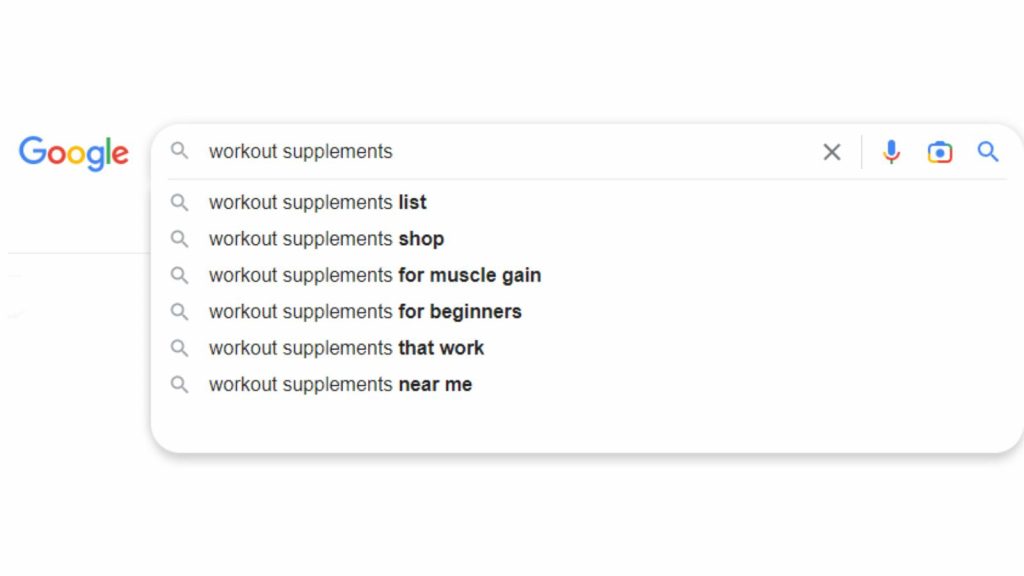
You can then click on each of these suggestions, to dig further down the niche.
Image Tags: Helps SEO For Affiliate Marketing
Google’s image tag is another method that can help you identify potential ideas to explore.
All you need to do is type a keyword or phrase into the search bar and then click on the images tab.
Once you do that, scroll down to find related tags. These are other keywords and phrases related to the topic which you can explore further:
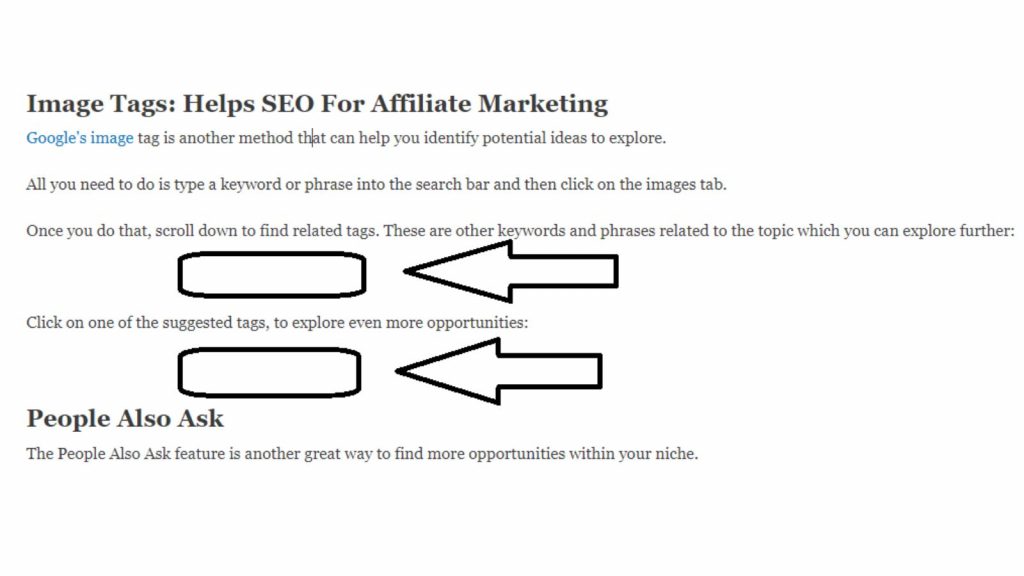
Click on one of the suggested tags, to explore even more opportunities:
People Also Ask
The People Also Ask feature is another great way to find more opportunities within your niche.
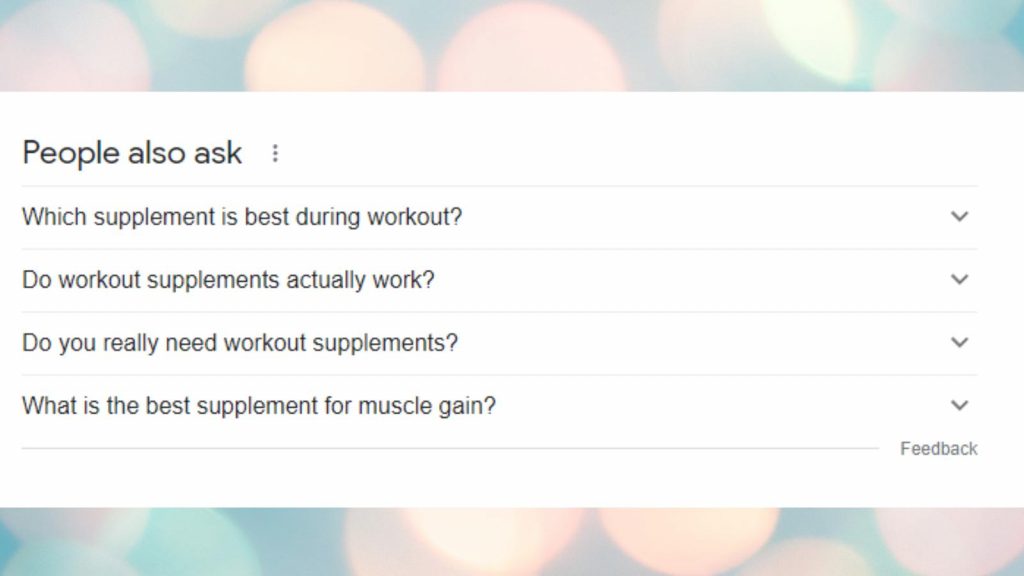
When you type in a keyword or phrase, related questions will usually appear in the middle of the search results:
You can click on any of these questions and additional related questions will appear.
This allows you to explore more topics within your niche and identify potential ideas for content creation.
Autosuggest
Google’s autocomplete feature is also helpful in exploring different topics within your niche.
When you start typing in a keyword or phrase, suggestions will appear right on your search bar:
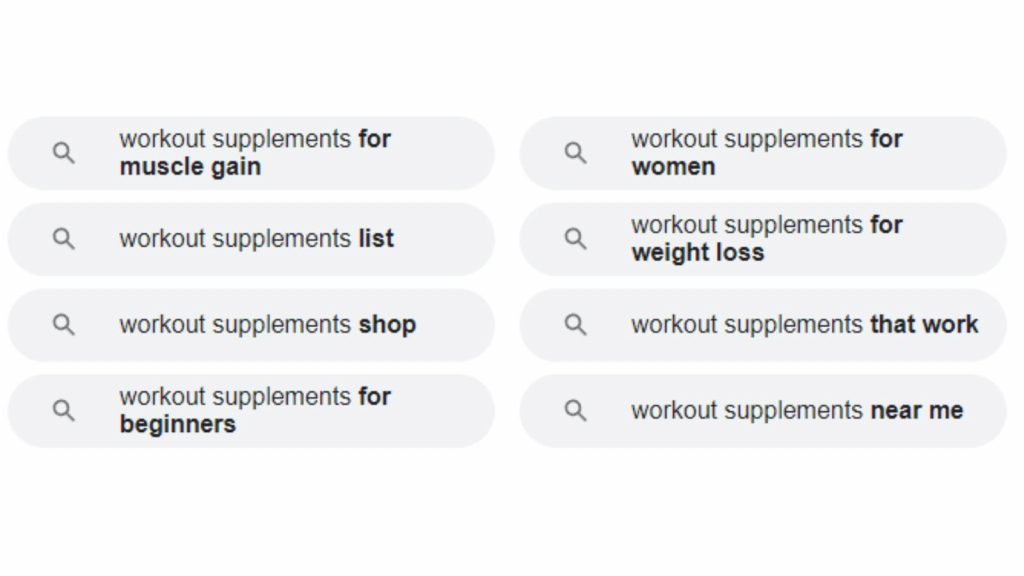
Use any of the terms to find your main website niche or further affiliate topics to cover.
This will also help you choose among the best affiliate marketing platforms.
2. Leverage Internal Links
Internal linking is a powerful strategy that often site owners underestimate.
It helps search engine crawlers understand your website better and it allows users to navigate through your site efficiently.
You should link related content together and use appropriate anchor text in order to make the connection even clearer.
Do you want to know a secret?
There is no such thing as an internal linking over-optimization penalty according to Google, so you can go wild with your anchor texts!
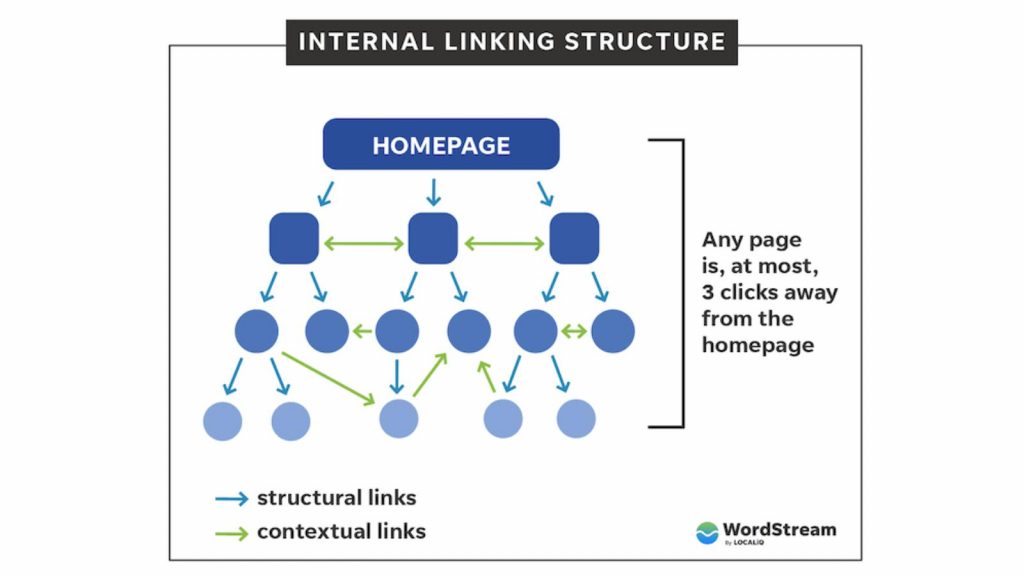
Here are some further tips on how to use internal links in SEO affiliate marketing:
- Correct Use of DoFollow/NoFollow Tag
- Add New Content Links In Old Posts (and Vice versa)
- Leverage Topic Clusters
- Choose the Right Anchor Text
Correct Use of DoFollow/NoFollow Tag
It is important to set the right link attributes when you are linking your internal pages.
The rel=”dofollow” tag will allow equity to flow from page to page while the rel= “nofollow” tag will not pass SEO value, but it can be useful in other ways such as telling search engines not to index a certain page.
For example, if you are linking to important pages, you should use the dofollow tag.
But, for affiliate links, you should use the nofollow tag as Google recommends it.
Add New Post Links In Old Content (and Vice Versa)
Adding new content links in your older posts can help you drive more traffic to your newer affiliate pages.
This is a great strategy because it can help you reach out to an already existing audience and direct them toward the newer content.
Also, if you have new blog posts or affiliate pages, you should link them to your older content. This way, your audience will be able to find out more about the new topics and eventually find your newer pages.
Plus, linking to older content can also help you increase the SEO value of your new posts!
Leverage Topic Clusters
Topic clusters are a great strategy for affiliate marketing.
It involves creating related content pieces around the same topics and using internal linking to connect them together.
You can create smaller ‘pillar pages’ which will provide an overview of the topic and then link to other more detailed pages on the same subject.
This will help you rank better in search engines since all of your related content will be connected together.
Plus, it will also make it easier for your users to find what they’re looking for on your website.
Choose The Right Anchor Text: Better SEO For Affiliate Marketing
When setting your internal links anchor text, you should make sure that it’s SEO-friendly and relevant to the content you’re linking to.
You should also include keywords whenever possible, as this can help search engine crawlers understand the context of your content better and may even help you gain higher rankings.
As previously mentioned, there’s no over-optimization penalty for abusing exact anchor text matches on internal links, so you should take advantage of it!
3. Ramp Up Your Link Building Profile
In 2016, Andrey Lipattsev of Google made it clear that content and links are the most important ranking factors for search engine optimization. (That is still the case today in 2025.)

However, not all backlinks are created equal. Links from popular websites are more powerful than ones from low-quality sites.
For example, if you are in the business niche, a link from Forbes is much better than getting a link from a small blog in the pet niche. To ramp up your link-building profile, you need to focus on creating high-quality content that will attract natural links from relevant websites.
Here are some of the most effective affiliate marketing link-building strategies that you can employ:
- Guest Blogging
- Broken Link Building
- Content Assets
- Competitor Link Analysis
Guest Blogging
Guest blogging involves writing content for other websites in the same niche as yours. This can help you build relationships with influential bloggers and get backlinks to your own website in the process.
Make sure to use your keywords wherever possible and link to relevant pages on your own website whenever it adds value. Write quality content and focus on building connections with people in your industry.

Broken Link Building
Broken link building is another great strategy for affiliate marketers.
It involves identifying broken links on other websites, contacting the owners of those websites, and offering them replacements (which are usually external links leading back to your own site).
Content Assets As SEO For Affiliate Marketing
Creating high-quality content assets such as ebooks, white papers, infographics, case studies, and webinars can be a great link-building strategy.
By creating content that is useful to your target audience, you can generate natural links from other websites in the same niche as yours.
Competitor Link Analysis
Competitor link analysis is another powerful link-building method for affiliate marketers. It involves analyzing the backlinks of your competitors and finding ways to acquire similar ones for yourself.
This can be done by identifying the websites your competitors are getting links from, creating content that’s similar to or even better than what your competitors have created, and then reaching out to those websites to let them know about it.
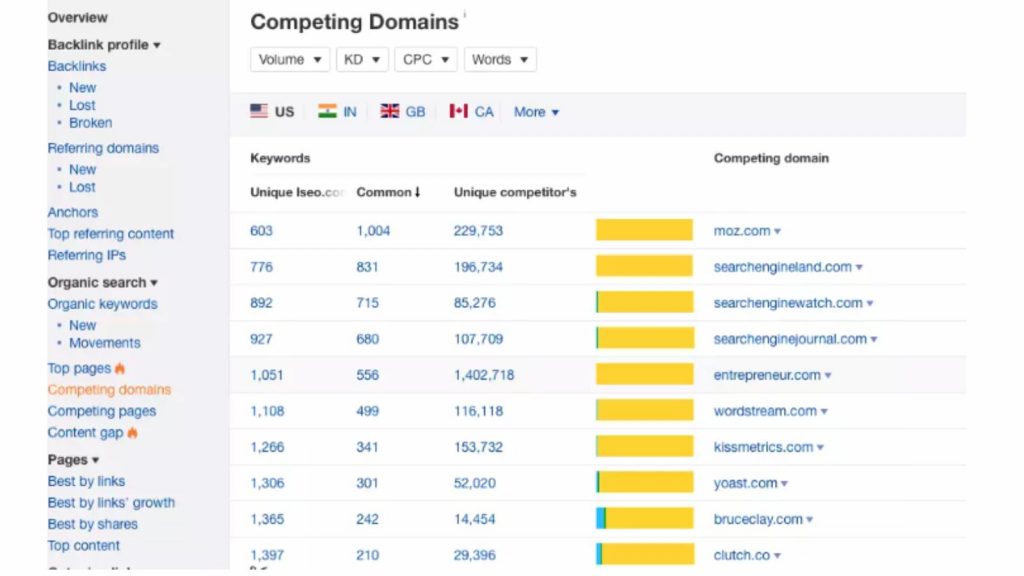
Image source from Search Engine Land.
4. Optimize Organic CTR for SEO For Affiliate Marketing
Organic click-through rate (CTR) is one of the most important SEO metrics for affiliate marketers to monitor.
Your goal should be to optimize your organic CTR in order to get more clicks and conversions from your marketing campaigns.
To do this, you need to work on how your content will appear on the search engine result pages. This way, you will be able to get more organic traffic, without actually increasing your rankings.
Try out these methods:
- Improve Title Tags
- Use Short URLs
- Write Compelling Meta Descriptions
- Optimize for Rich Snippets
Improve Title Tags
Having well-crafted title tags is one of the most important elements to master for affiliate marketing.
Title tags are what appear on the search engine result pages, so it’s important to make sure that they are optimized for your target keywords and are compelling enough to draw clicks from potential customers.
Make sure your titles include your primary keyword and also use action words like “buy” or “shop” to entice more clicks.
SEO For Affiliate Marketing Includes Short URLs
Using short URLs can help you optimize your organic CTR since it will make the link easier for search engines and users alike to read.
Also, when you use a shorter URL, people may be more inclined to click on it as opposed to a longer one.
Write Compelling Meta Descriptions
- Meta descriptions are the small snippets of text that appear below your title tags in search engine result pages.
- These need to be well-crafted, as they can have a big impact on whether potential customers click through to your website or not.
- Make sure your meta descriptions include a clear call-to-action and also use keywords related to what you are offering.
Optimize For Rich Snippets
Rich snippets are pieces of structured data that provide additional information about your content in the SERPs. They can help draw more attention to your content and improve its organic CTR by making it stand out from other results on the page.
To get rich snippets, you need to use a markup language like Schema.org to label your content and make it easier for search engines to understand.
Check if your affiliate pages support rich snippets by using the Structured Data Testing Tool from Google.
5. Focus On User Experience
User experience (UX) is an important factor for affiliate marketers to focus on. By improving the user experience of your website, you can make it easier for visitors to find what they are looking for and reduce their bounce rate.
Remember that happy users are more likely to trust your website and buy from your affiliate links! Try these methods:
- Reduce Loading Time with fast and reliable hosting.
- Improve Navigation with internal linking that makes sense.
- Be Mobile-Friendly – be sure your site look great and runs fast on mobile devices.
- Create Localized Content for your readers within your niche.
Reduce Loading Time Making The Best SEO For Affiliate Marketing
The speed at which your website loads can have a big impact on SEO. Google has stated that page loading time is one of its key factors in ranking websites.
So if your pages take too long to load, you may be missing out on potential customers who don’t want to wait around for them to finish.
The most important thing you should do is choose a fast and reliable hosting service, as this can have a big impact on how quickly your page loads. Additionally, consider using caching techniques and compressing files to reduce the amount of data that needs to be downloaded by visitors.
Finally, if you want to speed up your website even more, try to optimize your images, minify and compress your code and use a content delivery network (CDN) to speed up loading times.
Check the loading speed of your website by using tools like Google’s PageSpeed Insights.
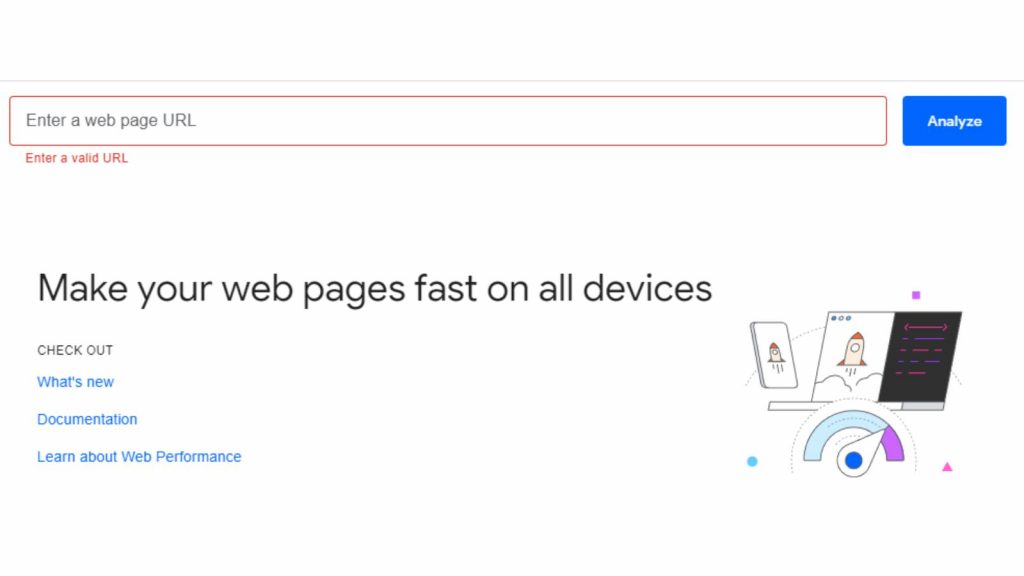
It will provide you with tips to improve your page loading speed and even suggest specific optimizations for your website.
Improve Navigation For Search Engine Optimization
Having a good navigation is essential for your website’s success. Make sure you have clear pathways for users to find what they are looking for by having an easy-to-use menu system in place.
It’s also important to link internal pages together so that search engines can easily crawl through them. Try using breadcrumbs to show users where they are on the site and provide an easy way to get back to a previous page.
You can also include a search box to quickly find pages and content as you see here on Inspire To Thrive.
Finally, use intuitive labels for your menus and links so that visitors know where they are going at all times. This will also help search engines understand what your pages are about and make it easier for them to index your content.
Seo For Affiliate Marketing Includes Mobile-Friendly
In today’s digital world, having a mobile-friendly website is essential.
More and more users are accessing the web from their martphones and tablets, so it’s important that you make sure your website is optimized for these devices.
You can do this by making sure your design is responsive to different screen sizes, using large buttons and links that are easy to click on mobile devices, and reducing the amount of text on your pages.
If you are using WordPress, you can install a responsive theme or a plugin to help you make your website mobile-friendly.
Create Localized Content
Localized content involves translating and adapting your existing content to fit the language and culture of the target market. This content should be customized for each region and tailored to the cultural norms of that audience.
For example, if you’re targeting customers in Asia, you’ll need to include keywords related to the culture there, such as traditional Chinese medicine or local festivals. You’ll also need to be mindful of any slang words or dialects that are common in the area.
When creating localized content, it’s important to make sure all of your content is accurate, engaging, and coherent. You should also consider the culture of your target audience to ensure the content resonates with them.
In addition, you should use professional translators for accuracy and ensure your content sounds natural.
Bonus Tip with Perplexity AI
Using Perplexity AI for SEO in affiliate marketing can be a smart move. It helps you understand how different keywords work together, giving you insight into the search habits of your potential customers.
This can guide your strategy by showing you the less obvious terms your audience is searching for. Perplexity AI can break down complex data, turning it into easy-to-digest info that helps you choose better keywords.
These insights can boost your content, making it more relevant and likely to rank higher. This improved visibility can lead to more clicks and commissions for your affiliate site.
So, if you’re looking to up your SEO game, using Perplexity AI might just be the extra edge you need.
Final Words: SEO For Affiliate Marketing
SEO is a powerful weapon you don’t want to miss if you are an affiliate marketer. With it, you can improve organic traffic to your website and boost revenues from affiliations.
To get the most out of your SEO strategy, make sure you focus on improving title tags, using short URLs, writing compelling meta descriptions, and optimizing for rich snippets.
You should also pay attention to user experience by reducing loading time and improving navigation.
By following these tips, you’ll be well on your way to increasing your revenue as a successful affiliate marketer. Good luck!
Affiliate SEO FAQs To Boost Your Affiliate Revenue
SEO for affiliate marketing means optimizing content so people find your reviews and guides in search. The goal is qualified traffic that converts, not just clicks. You match search intent, remove friction, and earn trust.
Target bottom and mid funnel terms. Examples: “best [product] for [use]”, “[product] review”, “[product] vs [product]”, “coupon”, “alternative to [brand]”. Use long-tail phrases with clear intent and buyer modifiers, then support them with informational topics.
Align page types to intent. Reviews for product names, comparisons for vs queries, list posts for best-of queries, tutorials for how-to queries, and deal pages for discount queries. Keep each page focused on one intent.
Long enough to fully answer the query. Most converting pages range from 800 to 2,500 words, depending on topic depth. Cut fluff, add specifics, and use clear headings.
No, if you use proper attributes. Add rel=”sponsored” to affiliate links, and rel=”nofollow” when needed. Avoid auto-linking every mention, and keep a healthy mix of non-affiliate links to helpful sources.
- Affiliate Marketing: 5 Foolproof SEO Techniques to Boost Revenue - October 24, 2025
- How to Increase the Sales of Your e-Commerce Site: 5 Tips - February 24, 2025
- How Social Media Is Changing How Big Brands Interact - February 28, 2024





All excellent tips Erik. Most bloggers rush the trust-building process, never gain much credibility, barely sell anything, then quit. Affiliate marketing seemed highly difficult to them but they simply panicked, rushed the process and did not slowly gain credibility by publishing detailed, optimized content and by building strong friendships with bloggers from their niche. Do these things for a long, long time and affiliate sales will find you.